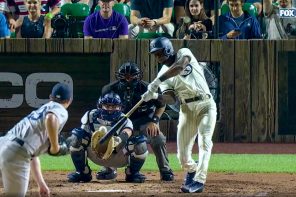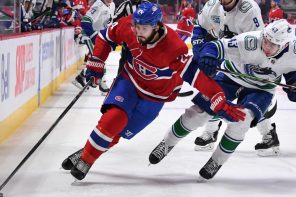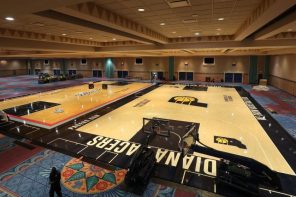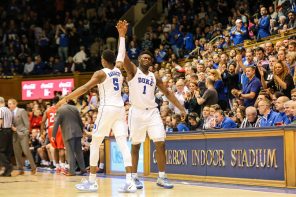Jordin Kudluk Tootoo is a hunter: his role in the hockey rink is to agitate and fight. He stalks his prey with a composed vigilance, only to strike with a fiery ferocity. His docility on land contrasts his fury on ice. Aptly, his middle name translates to ‘thunder’. I met Jordin in 2017, when he was playing for the Chicago Blackhawks. He told me about his story and the mentality that he required to survive and succeed in the most harsh and cold of circumstances. In light of his recent retirement, as the first Inuk in National Hockey League (NHL) history, this is his remarkable story.
Rankin Inlet, a Nunavut community of several thousand people, is unhealthily large by traditional Inuit standards. But in the vast expanse of white, Rankin Inlet is tiny. It is relieving to finally find Rankin Inlet on the map. It is impressive to know that people live in such desolation. It is small, and it is really, really far away. Unremarkable, almost invisible, and only there if you know where to look. Up north, an Inuk may hunt a caribou, but the cold hunts both. Yet, from tiny Rankin Inlet has come one of the finest agitators plying their trade in professional hockey. His name is Jordin Kudluk Tootoo.
Jordin is the alloy of influences and constraints, and tough circumstances create tough minds. Jordin’s wife, Jennifer Tootoo, says her husband is “ so mentally tough compared to a lot of people”. This becomes evident as Jordin’s story unfolds. Does Jordin credit his success to where he grew up? He explained, “Absolutely. It’s survival. Having to deal with freezing cold temperatures. Going out on the land to bring food back; if you don’t, your family’s gonna starve. You find a way to get it done”.
Tiny and still, Rankin Inlet is an icy Pandora’s Box. It is a black hole of alcohol and drugs whose predatory pull claims livelihoods and lives. Jordin notes in his book that, “Alcohol is the drug of choice in Rankin Inlet, but if you’re visiting from the outside you would never know it”
Within the harsh environment, Jordin’s upbringing was saturated with hardship indoors. Jordin and his brother, Terence, were raised by abusive, alcoholic parents. “I always grew up being scared of my parents”, Jordin recalls. “My mother drinks with my father. Back when I was drinking, Terence and I would be right there with them”. Jordin and Terence found solace in hockey. It was a break from struggles at home; Jordin recollects that “[they] were always at the rink because [they] never wanted to be home”.
But solace was short-lived; the gravity of addiction had taken another victim. Terence killed himself at the age of 22. His final note to his younger brother read, “Jor, go all the way. Take care of the family. You are the man”. Despite the death of his brother, Jordin persisted; he went “all the way”. In 2003, Jordin became the first Inuk in the NHL, debuting for the Nashville Predators.
The chances of anyone from Rankin Inlet making it to the most prestigious hockey league in the world are miniscule. The North has plenty of ice, but tundra is not known for producing athletes of caliber. Jordin was taught on frozen ponds by his father, and “trained by shovelling snow”; there were no speed coaches, podiatrists, or fitness trainers for him then. Yet he, an Inuk, plays professional hockey.
The chances of anyone from Rankin Inlet making it to the most prestigious hockey league in the world are miniscule.
But the consequences of success hit Jordin hard. To cope with his brother’s suicide, Jordin self-medicated heavily with “broads and booze”. While still a contributor to the Nashville Predators, Jordin admits: “I was a weekend binge drinker. It wasn’t like I’d wake up in the morning and need a drink. It’s just that when I drank, I’d f**king drink like I was from the Far North–you know, that’s in my blood […] booze was my drug. […] I would force people to drink with me, just like my dad does”.
Weekend boozing meant playing hockey with hangovers; “‘guilty hockey’– where you work extra hard to show that you weren’t really out the night before”. Inevitably, alcoholism degrades performance in the rink. The Predators’ management had seen enough and gave Jordin an ultimatum: “If you don’t [enter the NHLPA substance abuse program], we’ve got to let you go.”
Often the last person to recognize his life going down the drain is the person himself. Perhaps that is why it took Jordin so long to seek treatment. In December 2010, Jordin voluntarily entered an in-patient care program to treat his addiction. Jordin has not had one drink since.
Now, Jordin is with the Chicago Blackhawks. At 35, considered an elder on the ice, he carries his role as an agitator much like how he carries himself in all aspects of life: “One day at a time, one hour at a time, one minute at a time”. Although Jordin is very composed on the surface, he can be a nightmare to his opponents on the ice, just as how the simple portrait on his book cover does not convey the misfortune and affliction in his life. He is power in repose.
One must not attribute Jordin’s current role as an NHL agitator to his abusive past. He plays the way he learned; like anything else up North, he plays for survival. As I talk to him, I observe that Jordin is reserved for a man with a history like his. He has left his emotional baggage behind. It resides not in his mind, nor in Rankin Inlet, nor in Chicago. It is long gone, since he has, in his own words, “changed the cycle”. In Inuit culture, “cycles of life are based on belonging and in collective identity…. [the cycles cement] the mutual obligation of members of the society, and provides for a sustainable and more secure future”.
He plays the way he learned; like anything else up North, he plays for survival.
It may sound backwards, but Jordin has accepted his past; he has come to terms with his troubles growing up: “I don’t ever regret the way things were. It’s made me who I am today”.
Cycles appear in Jordin’s life, and their beginnings and endings mark important milestones: the arc of his hockey career, the violent loss of Terence, his path to sobriety, and his marriage with Jennifer. But like the turn of seasons, it is time for Jordin’s next cycle: being the father to his two daughters and engaging in Indigenous communities.
I reached out to Jordin’s wife, Jennifer Tootoo, for a statement on Jordin’s recent retirement and his plans:
“Jordin is so excited for this next chapter. He is leaving the game at peace. He knows the time is right. He can’t wait to be home with our girls and be a dad like he has always wanted to. He’s coming up to eight years of sobriety in December. Nothing is going to stop him now. Now he will be able to focus on doing work with Indigenous communities and focusing on the youth that are at risk for suicide. Hockey was and always will be a big part of his life and he will cherish those memories forever”.








